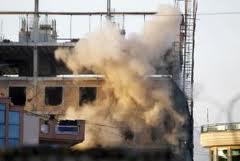
Kabul, April 16: Loud explosions and intense gunfire erupted at dawn in the Afghan capital Kabul on Monday after heavy fighting overnight between security forces and militants holed up in the central diplomatic area.
NATO helicopters launched strafing attack runs on gunmen hidden in a construction site overlooking the NATO headquarters and several embassies, including the British and German missions.
Insurgents fired automatic weapons at Afghan army special forces and police, who responded with rocket-propelled grenades during street fighting in the capital that has so far lasted almost 16 hours.
Explosive flashes lit alleys and surrounding streets.
The assault by the insurgents, which began at midday on Sunday with attacks on embassies, a supermarket, a hotel and the parliament, is one of the most serious on the capital since US-backed Afghan forces removed the Taliban from power in 2001.
It highlights the ability of militants to strike the heavily guarded diplomatic zone of the city even after more than 10 years of war.
The Ministry of Interior said 19 insurgents, including suicide bombers, had died in the attacks in Kabul and in at least three provinces and two were captured. Fourteen police officers and nine civilians were wounded.
The Taliban claimed responsibility for the attacks, but some officials said the Haqqanis, a network of tribal militants who live along the Pakistan-Afghanistan border, were likely involved.
"My guess, based on previous experience here, is this is a set of Haqqani network operations out of north Waziristan and the Pakistani tribal areas," American Ambassador Ryan Crocker told CNN.
"Frankly I don't think the Taliban is good enough."
The attacks were another election-year setback in Afghanistan for US President Barack Obama, who wants to present the long campaign against the Taliban as a success before the departure of most foreign combat troops by the end of 2014.
"These attacks are the beginning of the spring offensive and we had planned them for months," Taliban spokesman Zabihullah Mujahid told Reuters.
He said the onslaught was revenge for a series of incidents involving American troops in Afghanistan - including the burning of Korans at a NATO base and the massacre of 17 civilians by a US soldier - and vowed that there would be more such attacks.
The Taliban said on Sunday the main targets were the German and British embassies and the headquarters of the NATO-led force. Several Afghan members of parliament joined security forces repelling attackers from a roof near the parliament.
FAMILIAR TACTICS
The attacks in Kabul come a month before a NATO summit at which the United States and its allies are supposed to put finishing touches on plans for the transition to Afghan security control, and days before a meeting of defense and foreign ministers in Brussels to prepare for the alliance's summit in Chicago.
They also come in the run-up to Western forces leaving Afghanistan under a plan to hand over responsibilities to the Afghan forces by 2014.
That may prompt some to draw comparisons with the 1968 Tet Offensive during the Vietnam War. There are major differences in the scale and length of the events and casualties but the assault may still challenge assertions that America is winning.
Afghan security forces apparently failed to learn lessons from a similar operation in Kabul last September, when insurgents entered construction sites to use them as positions for rocket and gun attacks.
On Sunday, insurgents entered a multi-storey construction site overlooking the diplomatic triangle and behind a supermarket. There they unleashed rocket-propelled grenades and gunfire, protected from the view of security forces by green protective netting wrapped around the skeleton of the building.
Hours earlier in neighboring Pakistan, dozens of Islamist militants had stormed a prison in the dead of night and freed nearly 400 inmates, including one on death row for trying to assassinate former President Pervez Musharraf.




Comments
Add new comment